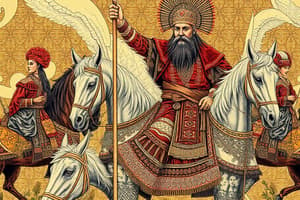Podcast
Questions and Answers
What was the title of Temujin when he ruled the Mongols?
What was the title of Temujin when he ruled the Mongols?
What empire was created in China by Kubilai Khan?
What empire was created in China by Kubilai Khan?
What does the term 'nomadism' refer to?
What does the term 'nomadism' refer to?
What was the Bubonic Plague?
What was the Bubonic Plague?
Signup and view all the answers
Who was Rashid al-Din?
Who was Rashid al-Din?
Signup and view all the answers
What does 'tsar' refer to?
What does 'tsar' refer to?
Signup and view all the answers
What was Beijing in relation to the Yuan Empire?
What was Beijing in relation to the Yuan Empire?
Signup and view all the answers
Match the following characters with their significance:
Match the following characters with their significance:
Signup and view all the answers
The Golden Horde was based in Southern Russia and adopted both the Turkic language and Islam.
The Golden Horde was based in Southern Russia and adopted both the Turkic language and Islam.
Signup and view all the answers
What was the significance of the Kamikaze winds in relation to the Mongols?
What was the significance of the Kamikaze winds in relation to the Mongols?
Signup and view all the answers
Study Notes
Mongols
- Mentioned as early as the Tang Empire, lived as nomads in Northern Eurasia.
- Established a vast empire under Genghis Khan in 1206, uniting Western and Eastern Eurasia.
Chinggis Khan
- Title of Temujin during his rule (1206-1227), signifying “oceanic” or “universal leader”.
- Founder of the Mongol Empire, instrumental in its expansion.
Nomadism
- A lifestyle driven by resource scarcity, involving regular migration for pastures and water.
Yuan Empire
- Established in China by Kublai Khan after the Mongol conquest of the region.
Bubonic Plague
- Bacterial disease spread by fleas, leading to severe mortality rates during the period; transmitted from rodents to humans.
- Late-stage humans could spread the disease through coughing.
Il-Khan
- A khanate in Persia founded by Hulagu, Genghis Khan's grandson, controlling parts of Iran and Iraq.
Golden Horde
- Founded by Batu, another grandson of Genghis Khan, based in Southern Russia.
- Adopted the Turkic language and Islam, also known as the Kipchak Horde.
Timur
- A member of the Mongol Chagatai Khanate, gained control over Central Asia and Iran.
- His descendants maintained an empire for nearly a century and established the Mughal Empire in India.
Rashid al-Din
- Adviser to Ghazan, ruler of the il-khanate, significant in the governance of the region.
Nasir al-Din Tusi
- A Persian mathematician and astronomer, he founded an influential academy aiding the development of planetary movement models.
Tsar
- Russian term used to refer to monarchy or emperor.
Ottoman Empire
- Islamic state founded by Osman around 1300 in northwestern Anatolia.
- Following the Byzantine Empire's fall, based in Istanbul from 1453 to 1922, it encompassed regions in the Middle East, North Africa, the Caucasus, and Eastern Europe.
Kublai Khan
- Last of the Mongol Great Khans, founder of the Yuan Empire in China.
Lama
- Tibetan term for a teacher, particularly in the context of Buddhism.
Beijing
- Served as the capital of the Yuan Empire.
Ming Empire
- Established by Zhu Yuanzhang after overthrowing the Yuan Empire, based in China.
Yongle
- The third Ming emperor, known for sponsoring the Forbidden City, Zheng He's expeditions, and revitalizing trade and travel.
Zheng He
- An imperial eunuch and Muslim who led state voyages across the Indian Ocean, enhancing trade links from Southeast Asia to Africa.
Choson
- Dynasty that ruled Korea from the Koryo kingdom's fall to the start of Japanese colonization.
Kamikaze
- Term meaning "divine wind," credited by the Japanese for repelling Mongol invasions in 1281.
Studying That Suits You
Use AI to generate personalized quizzes and flashcards to suit your learning preferences.
Description
Explore key concepts and terms from Chapter 13 of AP World History, focusing on the Mongols and their influence in Eurasia. This quiz features essential flashcards that cover notable figures and events related to Genghis Khan and the Mongolian Empire.




